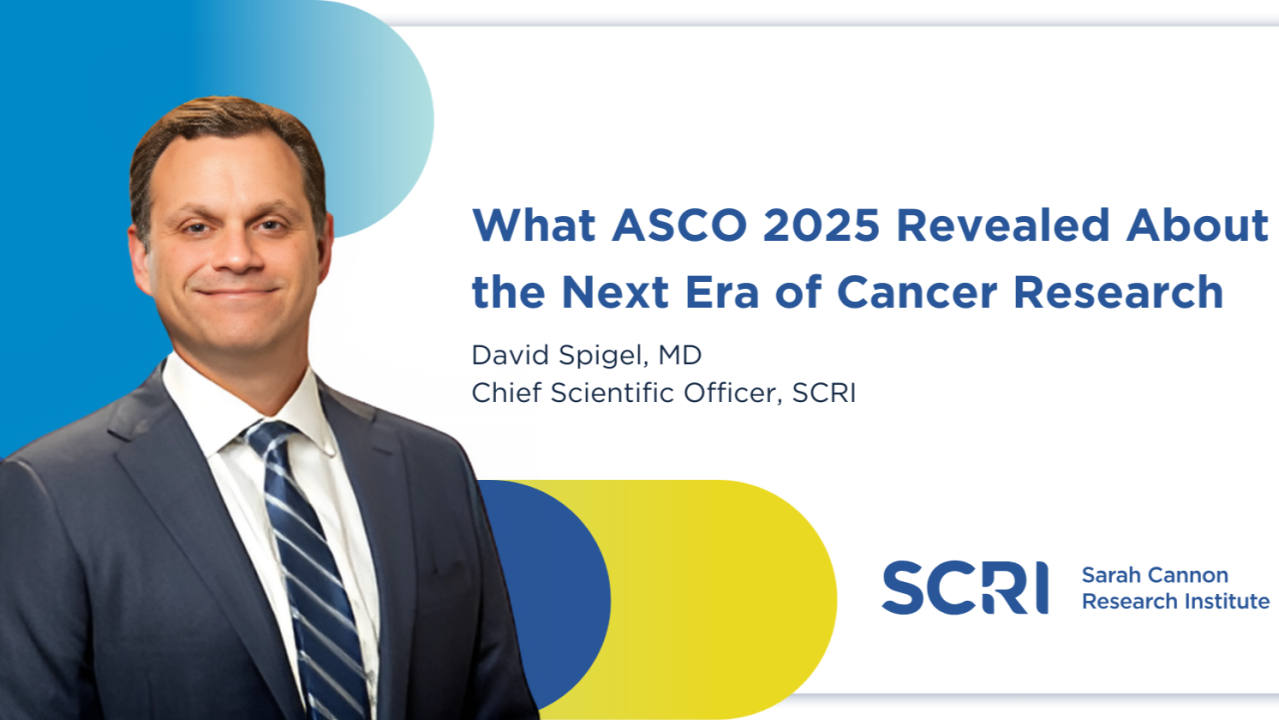David R. Spigel, Chief Scientific Officer at Sarah Cannon Research Institute, shared a post on LinkedIn:
“Every year, the American Society of Clinical Oncology (ASCO) Annual Meeting brings together the global oncology community to share advancements, challenge conventions, and spark innovation.
This year marked the 60th ASCO Annual Meeting, and it was inspiring to reflect on how far we’ve come in understanding, treating, and transforming the lives of people living with cancer. Like previous years, I’m reminded of something constant: a deep appreciation for the patients we serve who make every breakthrough possible.
The meeting showcased major advancements across several cancer research areas, highlighting breakthroughs in precision medicine, immunotherapy, and exploring holistic approaches that prioritize both efficacy and quality of life for people with cancer.
Advancing Precision Oncology
The key focus in solid tumor research this year was the development of therapies tailored to tumor biology and resistance mechanisms.
In breast cancer, new data presented by Erika Hamilton, MD, Director, Breast Cancer Research; Executive Chair, Breast Cancer Research Executive Committee, SCRI, were particularly encouraging. Innovative approaches are expanding treatment options, especially for patients with endocrine-resistant or complex disease profiles.
For instance, vepdegestrant, a PROTAC ER degrader studied in patients with ESR1 mutations, demonstrated a statistically significant and clinically meaningful improvement in progression-free survival compared to fulvestrant. It’s a major milestone signaling a new era of oral, mutation-targeted endocrine therapies.
Dr. Hamilton also led presentations on HER2‑low metastatic breast cancer, including novel antibody-drug conjugates. Paired with that, our Chief of Early-Phase Drug Development, Vivek Subbiah, MD, contributed to the final ARROW data on pralsetinib in RET fusion-positive solid tumors, demonstrating its safety and anti-tumor activity across multiple tumor types. These developments reaffirm how targeted innovation is reshaping treatment approaches.
Progress in Blood Cancer
In hematologic malignancies, where long-term disease control has been especially challenging, we continue to see important progress. Dr. David Andorsky, Executive Member, Lymphoma Research Executive Committee, SCRI at Rocky Mountain Cancer Centers, presented interim findings from the Phase 2 ASC2ESCALATE trial on asciminib in patients with chronic-phase chronic myeloid leukemia after just one prior TKI. The data highlighted not just strong efficacy, but a favorable safety profile, offering promise for earlier intervention in care.
CAR-T and the Promise of Innovation
What was once limited to blood cancers is expanding rapidly into solid tumors. We saw this reflected in early-phase data on BI 770371, a SIRPα monoclonal antibody designed to block a biological signal that helps tumor cells escape immune surveillance, presented by Judy Wang MD, Associate Director, Drug Development, SCRI at Florida Cancer Specialists & Research Institute. When paired with the PD-1 inhibitor ezabenlimab, it showed encouraging early activity across various solid tumors, with good tolerability and early signs of disease control. These findings demonstrate an exciting evolution of immuno-oncology toward novel combinations and new targets.
Targeting Early-Stage Lung Cancer with Greater Precision
Lung cancer research continues to advance, particularly in earlier stages where treatment decisions can have a profound impact. This year’s findings included the use of a 14-gene molecular assay aimed at better identifying stage IA–IIA patients who may benefit most from adjuvant chemotherapy. The data suggested a meaningful improvement in disease-free survival, reflecting a shift that could potentially change clinical practice and how molecular testing can help refine care, even in the earliest stages of disease.
The Takeaway: Stronger Together
While it’s impossible to capture every story from ASCO 2025 in a single article, what stands out is the collective strength of the Sarah Cannon Research Institute network. Within 155+ accepted abstracts and presentations across more than 20 research sites and 55 early-phase studies, we see a consistent theme: advancing patient-centered research through collaboration, innovation, and shared purpose.
I’m especially proud to bring this mission to life at SCRI Oncology Partners, supported by the deep scientific expertise of SCRI and empowered by our collaboration with The US Oncology Network.
Thank you to every investigator, every trial team, and every patient partner who made these milestones possible. As we close out another successful ASCO, I’m proud of the strides we’ve made in cancer research and just as energized by the momentum building across the global oncology community. Here’s to many more ASCOs to come as we continue to learn, innovate, and progress forward, together.”
More posts featuring David R. Spigel.


